The Best Cat Food for Birmans
Quick Guide
By most accounts Birmans were sacred cats of the priests (kittahs) of the Temple of Lao-Tsun (the Abode of the Gods) in northern Burma. There in the 1890s, two Westerners – Major Russell Gordon and Auguste Pavie – were among those who protected the temple and its priests from invasion.
At that time they were told the legend of how the cats came to be. In this legend, a venerable priest who lived in contemplation of a goddess with sapphire eyes had a sacred cat with golden eyes who also contemplated the goddess. With enemies at the door, the elderly priest died in the presence of his goddess, with his dear cat beside him. At this moment the cat was transformed to a golden hue and his eyes changed to the same blue sapphire as the eyes of the goddess. His four brown paws turned to white. With an air of command the transformed cat oversaw the defeat of the temple’s enemies. For seven days he remained beside his master until he, too, died. Today the Birman (for “Burma”) is still known as the “Sacred Cat of Burma.” You can find various versions of this legend online. In return for helping the priests in their day, Major Gordon and his friend were given a pair of Birman cats as thanks, which they brought to France. There seems to be some question about whether Major Gordon and M. Pavie were real and whether they actually brought cats back to Europe. In other versions of the story, a disgruntled temple servant sold some of the cats to Westerners. At any rate, by around 1919, Birmans were certainly being bred in France. During the 1920s and ‘30s the breed had become quite popular, though it looked slightly different than Birmans today, with minimal white gloving on the paws. After World War II, the breed almost disappeared, as did many purebred breeds in Europe. The remaining Birmans were crossed with Siamese and Persians to recreate the breed. Birmans were first brought to the United States in 1959. Today they are one of the most popular breeds in the UK, the United States, and many other countries.
Known for being gentle, playful, and always wanting to “help,” Birmans typically make excellent family cats. They get along well with children, friendly dogs, and with other cats. They can develop a strong bond to one person and they do like to be the center of attention, but they are not as demanding or as bossy as the Siamese. They usually have a soft voice but they can be talkative if encouraged. They are intelligent, curious cats. While not extremely athletic, they are not lethargic and always want to know what’s going on. Occasional worship is appreciated but Birmans are rather laid back about being sacred cats.
What is the Best Food for Birman Cats?
- Earthborn Holistic Primitive Feline
- Instinct Grain Free Ultimate Protein Kibble For Cats Chicken Formula
- Wellness Complete Health (canned) Turkey& Salmon Recipe
- Tiki Cat Queen Emma Luau Variety Pack Canned Cat Food
- Orijen Cat & Kitten Grain-Free Dry Cat Food
- Smalls for Smalls Fresh Chicken Pate
- Wellness Complete Health Kitten Recipe
- Fromm Mature Gold
- Precise Naturals Senior Formula
- Nature’s Variety Instinct Limited Ingredient Turkey Formula
- L.I.D. Limited Ingredient Diets® Duck & Green Pea Canned Cat Formula
- NomNomNow
Diet & Nutrition
We realize that many cat lovers like the idea of feeding a raw food diet. Many Birman breeders prefer a raw or homemade diet for their cats. However, this kind of diet is not easy for everyone to follow. Most people feed their cats commercial cat food. Yet, even if you feed your Birman a commercial diet, you can make sure that you feed a good quality food.
As with other cats, we recommend that you choose food for your Birman that is AAFCO- (Association of American Feed Control Officials) approved. AAFCO is a voluntary membership association of local, state and federal agencies charged by law to regulate the sale and distribution of animal feeds and animal drug remedies. While AAFCO is not perfect, at least it provides some minimum standards for pet foods and labeling.
Here are some things you should look for in a good cat food:
- Named meats
- Avoid artificial colors, flavors, and preservatives
- Low carbs
Meat protein is very important for all cats. For this reason we do not automatically discount some cat foods that use meat by-products, especially if they are low in carbohydrates. This is different from the way dog foods are usually evaluated. With dog foods, meat by-products are often considered a lower quality ingredient. However, as obligate carnivores, cats have such a need for meat protein that many experts are willing to overlook this fact in order for cats to get the meat protein they need in their diet. You should also look for foods that have added taurine and added Vitamin A since cats need these nutrients in their diets and cannot make them in sufficient quantities in their own bodies.
Human grade ingredients and foods that are grain free and potato-free (as recommended by some breeders) would be ideal. However, some people may not be able to feed these foods, for whatever reasons. Or maybe your cat hates the most nutritious, expensive foods. Sometimes that happens. Floyd the Birman, the Sacred Cat of Burma, refuses to eat the cat food that is $5 per can. He wants the generic cat food from the grocery store that is pretty much pure crap. When that happens, do your best to get Floyd to eat a better quality food but remember that the most important thing is for your cat to eat, even if you hate the food he likes. It’s better for your cat to eat a lousy food than to stop eating. A cat that refuses to eat for a couple of days can start to have some serious health problems so let your cat have the lousy food. You can try to sneak some better quality food in with the inexpensive food. If your cat objects, try offering him some meat protein as a snack. He might like some cooked or raw meat added to his diet or as a treat. However, you shouldn’t let these additions become permanent since they will not be balanced with the other vitamins and minerals he needs in his diet. If your cat really refuses to let you upgrade his food, you can let the matter drop for a while and try again in a few weeks or months.
Many cat owners today prefer wet (canned or similar) foods over dry foods. Cats often have urinary tract diseases which are worsened by dry foods and not drinking enough water. Wet/canned foods provide much more moisture in the cat’s diet. However, there are some situations where you might prefer to feed a dry cat food or it fits better with your lifestyle. In these situations, make sure that you are providing your cat with plenty of fresh water. It’s often a good idea to provide an automatic waterer, especially the fountain type, since the running water seems to encourage cats to drink more.
Common Health Problems Related To Food
Birmans do have a few health issues such as hypertrophic cardiomyopathy. The Birman Health Foundation (in the UK) makes this statement about diet and hypertrophic cardiomyopathy in Birmans:
Old-fashioned sources may suggest protein restriction for cats with heart failure to prevent “metabolic stress” on the liver and kidneys. There is no evidence that protein restriction is needed for cats with heart failure. In fact, protein restriction can have a negative outcome because cats can lose valuable muscle mass, which can lead to decreased survival times. Unless severe kidney disease is present, a protein-restricted diet is not recommended for dietary management of heart failure. A high quality diet with at least 40-50% (cats) meat-based protein (on a dry matter basis) is recommended.
The foundation is more concerned with the cat’s salt intake in hypertrophic cardiomyopathy:
- Cats with no obvious signs of heart disease
If a cat has no obvious signs of heart disease, only mild sodium (salt) restriction is recommended. At this stage, it is more important to keep the sodium (salt) consumption at the same level every day to avoid sudden spikes in blood sodium level.
- Cats with moderate heart disease (heart enlargement)
For cats with moderate heart disease moderate sodium restriction is recommended
- Cats with severe heart disease / congestive heart failure
For cats with congestive heart failure significant sodium (salt) restriction is recommended and with refractory congestive heart failure may require extreme sodium restriction to help maintain their comfort when symptoms cannot be well-controlled with medication.
You can read more about their salt recommendations on their site. They also recommend the addition of certain supplements for Birmans with heart disease, such as taurine and carnitine, among others.
Birmans do have some special kidney issues. According to studies, the breed has smaller than normal kidneys, and cats can have unusually high concentrations of urea and/or creatinine in the blood. However, this does not seem to always indicate that the cat will have renal dysfunction. Per the study cited:
While the clinical significance of these findings therefore remains unclear, it seems appropriate to suggest that evidence of elevated kidney enzymes in an otherwise healthy Birman cat should not be over interpreted as evidence of severe or progressive disease. It would however, seem sensible to monitor affected cats, and to consider the possibility of renal dysfunction when undertaking anesthesia, surgery or treatment in cats of this breed.
We do recommend that you discuss this condition with your veterinarian. It may be advisable to monitor your Birman’s kidney situation throughout his life so you can be aware of any changes. As far as food recommendations, we did not find any suggestions to change the Birman’s diet because of their kidney status.
Like other cats, Birmans can gain extra weight, especially as they age. They are a large, somewhat stocky breed so they can gain weight more easily than some breeds and you should watch their weight and calories as they get older. Most cats today live indoors and many are spayed/neutered, which increases their risks of becoming obese since the absence of certain hormones can slow their metabolism. Obesity is one of the health problems most frequently seen in cats today. Many middle-aged cats (often between 5-10 years of age) gain weight, have excess body fat, and get very little exercise. Cats simply eat more food than they can use up with their energy requirements. This can be caused by overfeeding, by leaving down food for free feeding at all times, by feeding high-calorie foods, and by giving high-calorie treats, along with lack of exercise.
There can be other causes of obesity but in most cases cats become obese because they are eating more calories than they can use. If your Birman is overweight or obese, he should be encouraged to lose weight. A weight loss diet for cats typically relies on higher protein and fiber with lower fat. You can also encourage your cat to get more exercise.
Obesity can lead to serious health problems for cats so this condition should be addressed. It can reduce your cat’s lifespan, affect his bones and joints, digestive organs, and his ability to breathe properly.
Obesity in cats can also lead to diabetes mellitus. Symptoms of this form of diabetes include: constant hunger, weight loss, increased urination, and increased consumption of water. It can affect any cat but it is most common in older, obese cats. Male cats are more susceptible than females. Left untreated, this disease will shorten your Birman’s lifespan. It can be treated in several ways, depending on the severity of the condition, but there is no cure. Getting your cat’s weight under control usually helps a great deal.
Feeding
Birman Eating Habits
As with other cats, some Birmans have a hearty appetite and some can be finicky. Choose good quality, healthy food that appeals to your cat. Some people prefer one of the raw diets while others like to feed wet/canned food. There are good dry cat foods but many cat experts today recommend wet/canned foods instead of dry because of the urinary tract problems cats can have which are often linked to not having enough moisture in their diet.
Make sure you always have fresh, clean water available for your Birman.
You can typically feed a Birman kitten that is three-months-old three small meals per day. This can be reduced to two meals per day by the time the kitten is six months of age but you should be increasing the amount of food. Remove any food that is not eaten after about 10 minutes. This is particularly true with wet/canned food. Any food left sitting in the floor will soon go rancid. Overfeeding and free feeding, in general, can lead to obesity in cats. Don’t worry: although they are soft-spoken, your Birman is more than capable of letting you know when it’s time for dinner.
Best Cat Food For Birmans
Like other cats, Birmans will thrive on good food. While they do have a couple of health conditions that may need special attention or possibly a prescription diet at some point, most Birmans should do well on good quality foods that are available commercially (unless you plan to feed a raw or homemade diet). However, it’s always important to watch your cat’s weight and condition. If your cat begins to gain weight (or lose weight), that can be a sign of a change in his health and he should see a veterinarian. Becoming overweight or obese can lead to serious health problems for your Birman so you might need to change his food or cut back on his portions. While many Birmans live long lives, it’s always a good idea to check with your veterinarian if you have any concerns about changes in your cat’s eating habits, weight, physical condition, or behavior.
We do recommend paying attention to the calories in foods. If your Birman is having digestive problems, for example, you may be feeding him too much food. Check the calories and adjust his portion to the amount he actually needs. You can sometimes find calorie information on the can or bag. If not, check the web site for the brand. It is usually listed. AAFCO guidelines now recommend that pet food companies begin including calorie information for pets but not every company has complied.
Best Food For Adult Birmans
Research shows that adult cats need a minimum of 26 percent protein in their diet (dry matter basis). Many good quality cat foods will have a much higher percentage of protein. In the wild or living as a feral, a cat would eat 50-60 percent protein in their diet and around 25 percent fat, from catching live food. We have suggested some foods for adult Birmans that approach these figures. We think these foods are suitable for active young adult Birmans.
| Food | Price | Nutrition | Rating |
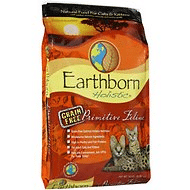 Read Reviews |
$2.29/lb |
 |
 |
 Read Reviews |
$4.50/lb |
 |
 |
 Read Reviews |
Varies |
 |
 |
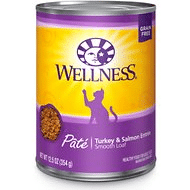 Read Reviews |
$2.83/12.5 oz can |
 |
 |
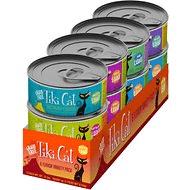 Read Reviews |
$1.52/2.8 oz can |
 |
 |
Dry Foods for Birman Cats
If you are looking for good dry foods, there are some that we like. Again, it is especially important to make sure that your cat is drinking plenty of water if you are feeding a dry cat food.
Earthborn Holistic Primitive Feline

Earthborn Holistic Primitive Feline is high in protein, grain and gluten-free. It has good sources of meat protein that Birmans should enjoy and it’s low in carbs. It also has the added nutrients and supplements that Birmans (and other cats) need to stay healthy. This is an all life stage formula so you can feed it to kittens and adult cats. Earthborn Primitive Feline also comes in a Wild Sea Catch Grain Free dry cat food formula and several canned recipes.
Instinct Grain Free Ultimate Protein Kibble For Cats Chicken Formula

Instinct Grain Free Ultimate Protein Kibble for Cats Chicken Formula uses only real chicken – no rendered meats, chicken meal, or by-product meal. It’s high in protein and slightly lower in fat than some other dry cat foods. We think it’s a good choice for Birmans that love their meat protein but might need to be a little more careful about calories. Otherwise, this food has everything your cat could want to stay healthy. And the food should appeal to your cat. The kibble pieces have a freeze dried raw coating for better taste. If your Birman likes a little more raw in his food, you can try Instinct Raw Boost Grain Free Kibble, with freeze-dried raw pieces mixed in with the kibble.
Wet Foods for Birman Cats
Smalls for Smalls Fresh Chicken Pate
Smalls for Smalls makes fresh, human-grade cat food carefully formulated for your cat based on a profile you create when you sign up. Smalls for Smalls recipes are great because they have a high protein content, providing your cat with the nutrition he or she needs to live a healthy lifestyle. They also have high water content, which will help keep your cat hydrated. Because cats are primarily carnivores, most of their nutrition should come from meat, and in Smalls for Smalls recipes, they do just that. Human-grade ingredients are fit for human consumption, so there is no guess work involved in figuring out if this food is safe for your cat or not. If you want to provide your cat with a wholesome meal with ingredients you can trust, Smalls for Smalls is a great choice.
Wellness Complete Health (canned) Turkey& Salmon Recipe

Wellness is another brand that is recommended by people who know Birmans. We like this food for Birmans because it has lots of meat protein and it’s low in carbs. We think this food comes close to the kind of protein and fat percentages your cat would eat if he were catching his own food. It should satisfy his craving for meat and it’s a healthy food. Wellness has lots of recipes so you can rotate and find flavors that your Birman likes.
Tiki Cat Queen Emma Luau Variety Pack Canned Cat Food

Tiki Cat is another food that is often highly recommended for adult cats. We think that Birmans can benefit from eating this food. This food contains very natural ingredients with added vitamins and minerals. It’s high in moisture, protein, and fat, like food that your Birman would catch as prey. Tiki Cat’s foods mimic live prey to a great extent and are biologically appropriate for cats. This variety pack features twelve 2.8-oz cans of the following formulas: (2) Hookena Luau, (2) Hanalei Luau, (2) Koolina Luau, (2) Puka Puka Luau, (2) Papeekeo Luau and (2) Napili Luau which provides your cat with ahi tuna and chicken, wild salmon, two different kinds of chicken, tuna and mackerel, and salmon and chicken. Grain, gluten, carbohydrate, starch and flour-free recipes.
Best Kitten Food For Birmans
Food for kittens should have an AAFCO nutritional adequacy statement that says the food is appropriate for growth/reproduction. All life stage foods can also be fed to kittens since these foods have been approved for cats at all stages of growth and for adult cats. Kittens have different nutritional needs than adult cats on a maintenance diet. For example, kittens need a minimum of 30 percent protein for growth, while adult cats need a minimum of 26 percent. Kittens need more calcium while they are growing, and so on. So, look for foods that are especially made for kittens or foods that are all life stage foods (which may also be labeled as “growth and reproduction”).
| Food | Price | Nutrition | Rating |
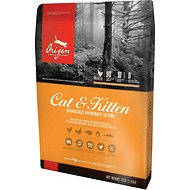 Read Reviews |
$2.29/lb |
 |
 |
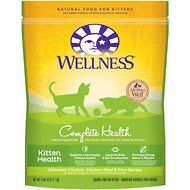 Read Reviews |
$4.50/lb |
 |
 |
Dry Foods for Birman Kittens
Orijen Cat & Kitten Grain-Free Dry Cat Food

If you prefer a dry food for your kitten, we suggest the bestselling Orijen Cat & Kitten Grain-Free Dry Cat Food. Like other Orijen foods, Orijen Cat & Kitten is biologically appropriate. Some 90 percent of the ingredients are poultry, fish, and eggs, with just 10 percent from vegetables, fruits, and botanicals. The food contains whole prey ratios of meat, organs, cartilage, and other ingredients so it is more natural and like eating nutrients from live prey for your Birman kitten. Kittens should also find the food tasty since it has infusions of freeze dried liver. Note: this food is now made in Orijen’s Kentucky kitchens. Orijen also makes several other dry cat foods which are described in this brochure.
Wet Foods for Birman Kittens
Wellness Complete Health Kitten Recipe

We think Birman kittens will do well on Wellness Complete Health Kitten Recipe. This food has plenty of protein, fat, and calories to provide the energy your kitten needs to grow. Healthy ingredients support healthy growth. We think your Birman kitten will grow strong muscles and bones eating this food.
Best Cat Food For Senior Birmans
Senior cats tend to be different from senior dogs. Most mature cats have decreasing energy needs until they are about 11 years of age. At that time their energy requirements start increasing again as they grow older. Middle-aged cats often have problems with obesity but as they age, cats can begin to lose weight. These elderly cats may not digest or absorb protein and fat as well as younger cats. They often need food that is easy to digest so they can get the energy they need. As your cat gets older, it’s important to monitor his weight and condition so you can adjust his diet. There is no need to restrict the amount of protein your older cat eats unless he has a specific health issue and your veterinarian recommends a change in his diet.
Bearing in mind the fact that Birmans often live to be around 15 years of age, these are important considerations for this breed.
Dry Foods for Senior Birmans
Fromm Mature Gold
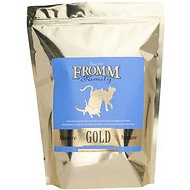
High in protein and moderate in fat, Fromm still has enough calories to keep your older Birman happy. This food has the same good ingredients that Fromm foods normally have but they manage to make this food with a little less fat. We think this food is good for less active older Birmans and those who might need to lose a little weight. Fromm also has an adult Gold formula and one for kittens.
Wet Foods for Senior Birmans
Precise Naturals Senior Formula

Another food we recommend for older cats is Precise Naturals® Senior Formula, especially if you prefer a canned food. This food has ingredients that your Birman should find tasty and easy-to-digest. It has high protein and fat and plenty of moisture in this canned form. Plus, Precise is known for making specialized diets. We think senior Birmans can benefit from eating this senior formula.
Best Cat Food For Birmans With Food Allergies/Intolerances
Any animal can have a food allergy or intolerance, regardless of breed. If your Birman has a sensitive stomach or a skin irritation due to a food intolerance, here are some foods we recommend.
Sensitive Stomach
If your cat has a sensitive stomach he may vomit or have diarrhea. He may gag. He may refuse his food or not eat from time to time. As someone who loves your cat, you know how distressing this can be. You may want to take your cat to the vet to make sure there is nothing wrong. If the problem is a sensitive stomach, you may need to try different foods to find out what your cat can tolerate eating. Sometimes a limited ingredient diet cat food is a good choice, especially if you can identify the particular ingredient(s) which bother your cat and avoid them. Wet/canned foods usually have fewer ingredients than dry foods so it’s often easier to avoid certain ingredients if you feed a canned food. These foods may only contain a meat protein, added vitamins and minerals, and a couple of other ingredients. Dry foods often have many more ingredients since they require carbs/starches and binding ingredients.
Natural Balance makes several dry and canned limited ingredient foods that are considered to be hypoallergenic. The protein is comparatively low (for a cat food) and the fiber content is high so you can expect your cat to have softer stools on these foods. The formulas have single-source proteins and limited carbs. These foods are often recommended for cats with sensitive digestion.
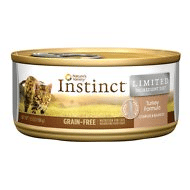
We also like Nature’s Variety Instinct Limited Ingredient Turkey Formula (and their other limited ingredient formulas). Instinct uses a single source of animal protein in these formulas. The ingredients are easy for a cat like your Birman to digest. You can feed the food in rotation with other formulas or stay with one formula. The food has plenty of protein which should satisfy your Birman. And, since it’s a canned food, there is plenty of moisture in the food. We think one of these limited ingredient diet Instinct foods is a good choice for any cat with a sensitive stomach.
Skin Irritation
Birmans, like other cats, can also develop skin irritations due to food allergies. The allergy can make them itch, which leads to scratching, which makes the skin raw. Next thing you know, you have irritated skin which can get infected. If your cat does have this kind of skin allergy, it’s a good idea to see your veterinarian. You may need to work through food trials and an elimination diet to identify the ingredients that your cat is allergic to.
If you think you know the cause of your cat’s food allergy, you can try to find foods that don’t contain that ingredient. Again, we recommend a limited ingredient diet. Foods with fewer ingredients are less likely to contain the offending ingredient and it’s easier for you to control what your cat is eating. If you do need to use an elimination diet, there are prescription diets. You just need a prescription from your veterinarian and you can order the food online.
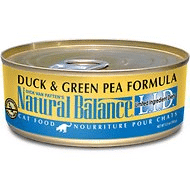
For a limited ingredient diet without a prescription you can try one of the foods from Natural Balance such as L.I.D. Limited Ingredient Diets® Duck & Green Pea Canned Cat Formula. The Natural Balance LID foods use a single source of animal protein and limited carb sources. They are grain free and they use alternative ingredients that are less likely to trigger a reaction in your Birman. Some of the protein comes from peas to avoid animal protein triggers. This is a bestselling food for all cats that have food allergies and we think a Birman with a food allergy would benefit from it.
Best Human-Grade Cat Food
NomNomNow
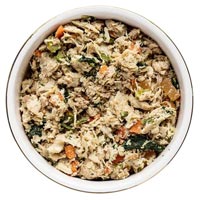
NomNomNow cat food is a human-grade cat food, making it one of the best choices for your Birman. When you sign up for the service, you complete a profile all about your cat, and NomNomNow will create a specially designed recipe just for your pet, as well as a customizable delivery schedule. NomNomNow foods are high in protein and high in moisture, something that is beneficial for cats as they usually need high protein diets, and they get a lot of their water intake through their food. The chefs who customize your cat’s recipe will take into consideration their lifestyle, so you know that your cat will be getting enough calories to stay healthy and strong, but not so many that they are gaining weight or becoming unhealthy.
Conclusion
Birmans are beautiful, gentle, intelligent, sociable, and they make wonderful pets. We hope this look at their dietary needs is helpful. For the most part, your Birman should be able to eat the same good quality cat foods that are recommended for other cats. If your cat does have a problem with kidney disease or heart disease, talk to your veterinarian. You may need to make some adjustments to your Birman’s diet in these cases.













